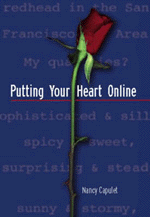Copyright © 1999 by Mary Eisenhart.
All rights reserved.
Hearts Online--A Publishing Adventure
By Mary Eisenhart
Nancy Capulet put her heart online,
met the man of her dreams, and wrote a guidebook for others on
similar quests.
 Last spring, Nancy
Capulet had a book ready for publication, on a subject with
broad appeal--a guide to online dating. Having met the man who's
now her husband via the world of Internet matchmaking services,
she could address the subject with a certain credibility, and
the book was well-grounded in her own experience and that of many
others.
Last spring, Nancy
Capulet had a book ready for publication, on a subject with
broad appeal--a guide to online dating. Having met the man who's
now her husband via the world of Internet matchmaking services,
she could address the subject with a certain credibility, and
the book was well-grounded in her own experience and that of many
others.
Like John Walker's Hacker's
Diet, which she points to as one of her book's cultural forebears,
Capulet's book takes a distinctly engineering-driven, problem-solving
approach to the quest for a romantic partner. Challenging the
pleasant but ill-founded notion "if it's meant to be, it
will happen," Putting
Your Heart Online begins:
What would you think if someone said, "If I'm meant
to get a raise, I'll get it," "If I'm meant to win a
marathon, I will," or "If I'm meant to be president
of the United States, I'll be elected"? Most people have
to work to achieve their goals. Why should dating be any different?
The book goes on to discuss the online matchmaking landscape,
along with assorted tips for negotiating its occasional pitfalls.
It addresses such delicate issues as the balancing of candor and
self-marketing, men's and women's Mars/Venus approaches to personal
ads, how to give and receive rejection gracefully, etc. With abundant
real-life examples, Putting Your Heart Online offers encouragement
in the form of bracing, highly practical advice on finding that
person who's truly in sync with you.
The Independent Publisher
With the draft of the book finished by April, Capulet was conversing
with several prospective publishers, considerably taken aback
by their apparent pride at being able to have books on the retailers'
shelves by Valentine's Day 1999.
"I just thought, 'I can get it out by June!'" Capulet
recalls.
Opting to self-publish the book, Capulet drew on her own previous
experience. Better known in technical circles as Nancy Blachman
of Variable Symbols
Inc., she's the author of several books on Mathematica software.
"When I wrote technical books, it was easy to find a publisher,"
she says. " I had several publishers begging me for my first
book, and they were always expressing interest in my subsequent
ones." One of them, Mathematica Quick Reference, was
her first foray into self-publication, and sold well enough that
it was picked up by a commercial publisher. How different could
the mainstream market be? she figured.
Now living in Princeton, N.J., with her husband and working
on technical projects, Capulet looks back on a hectic year spent
publishing and promoting her book in venues ranging from talk
radio and book-signings to online-dating workshops on campuses
and in church halls: "I got the book out and I learned a
lot about the publishing world."
The decision to produce the book on her own was driven by a
number of factors, not least her previous (though, as it turned
out, quite different) experience with Mathematica Quick Reference.
Whereas her technical books had spawned bidding wars in their
well-defined and well-funded market, a mass-market book was a
much harder sell.
"My agent shopped my proposal around to 30 publishers,
and all we got was rejections," Capulet recalls. "Since
I had self-published one time before, then found a publisher because
they saw that there was demand, I felt pretty confident that if
I got this book out, people would like it, and then a publisher
would pick it up."
Another critical issue was the notorious volatility of the
Internet, which practically guaranteed that at least some of the
information in any Internet-related book would be obsolete before
the book saw print.
"My book had timely information, and I didn't want to
wait," Capulet explains. "In fact," she adds, "it
has a chapter on one matchmaking service, Good Company, which
went out of business by the time the book was published. It was
a lively business when I wrote it up. They had venture capital;
they looked like a big one, so I actually made a point of putting
them in the book, but they vanished within a couple of months."
Dealing with the practical issues of getting the book printed
was relatively easy. Using Dan Poynter's Self
Publishing Manual, which she describes as "my bible,"
Capulet sent solicitations for quotes to most of the printers
listed in the book, then asked the candidates with the three most
attractive bids for references.
In the end, she chose Michigan-based Patterson Printing, which
had submitted the second-lowest bid. "The least expensive
one told me they had misquoted when I started asking questions,"
she says, pointing to a common pitfall for the unwary.
She then hired a graphic designer to design the book's cover
and graphics, as well as to offer advice on page layout. The artist
delivered film of the cover art. Capulet herself typeset the pages
using the LaTeX typesetting system, printed them out on a 600
dpi laser printer, and sent them to Patterson for transfer to
film.
"If I were to do it again, I might look for a printer
that could take PostScript," she says now. "The reason
I didn't do that this time was that I was fearful that something
would go wrong, like the wrong font would get used. By providing
camera-ready copy, I knew what the pages would look like."
The Gentle Art Of Self-Promotion
The challenge of getting the books printed was minor compared
to the never-ending task of sales and promotion.
 "Publishing houses really
have their marketing channels greased," Capulet says. "If
you self-publish, you're really going to have to peddle your books
a lot. I started writing to bookstores and the press, and to wholesalers
and distributors trying to get them to carry it.
"Publishing houses really
have their marketing channels greased," Capulet says. "If
you self-publish, you're really going to have to peddle your books
a lot. I started writing to bookstores and the press, and to wholesalers
and distributors trying to get them to carry it.
"I do feel that I need to go out on the road if I'm going
to sell the book. When I do marketing, I can see more sales directly.
When I hold back on the marketing, I can see the sales drop off.
I have wholesalers, and I can see how much they're ordering. They
look at your trend. If you sell more books, they'll order more
books. If your trend starts going negative, they'll taper back
on their order."
Creative thinking is often called for, as Capulet discovered
when, following a talk she'd given at the local Borders, the other
local bookstores refused to schedule her on the grounds that she'd
already spoken at the competition's place. Unable to market the
book directly in those venues, she launched a discussion group
at the local independent, Encore Books, on the subject of Public
Relations For Writers.
"This is a group for discussing how to get the word out,
for aspiring writers, or established writers who don't feel that
they're getting the attention they deserve," Capulet explains.
"I'd been marketing my book quite a bit, but I thought I
could share information with other people."
Networking and information-sharing also turned out to be a
useful marketing strategy. Encore's event coordinator proved a
great source of press contacts, several of which resulted in articles
about the book. Also, one Borders event coordinator provided contact
info for counterparts at other Borders stores.
Today, Capulet maintains a website,
which not only provides information about Putting Your Heart
Online but allows matchmaking services to post information
about themselves, compensating somewhat for the inherent obsolescence
of printed information.
After a year of writing, publishing, and promoting a book,
all the while planning her New Year's Day wedding, Capulet now
says, "I used to think that publishers ripped people off,
but now I have more respect for what they do. It may seem that
they don't have to do much work for your book, but if you do it
yourself, you have to do an awful lot."
But, she adds, "A lot of people complain that their editor
edited their work badly. I got complete control--I got to write
it the way I wanted to write it. I got to put the cover on it
that I wanted to put on. Everything was mine. If I have any complaints,
I have to complain to me."
Nancy Capulet will host a discussion of making winning book
proposals and press kits at the February 22 meeting of Public
Relations For Writers, 7:30 pm at Encore Books., Princeton Shopping
Center, Princeton, N.J. Call (609)252-0608 for information.

 Last spring, Nancy
Capulet had a book ready for publication, on a subject with
broad appeal--a guide to online dating. Having met the man who's
now her husband via the world of Internet matchmaking services,
she could address the subject with a certain credibility, and
the book was well-grounded in her own experience and that of many
others.
Last spring, Nancy
Capulet had a book ready for publication, on a subject with
broad appeal--a guide to online dating. Having met the man who's
now her husband via the world of Internet matchmaking services,
she could address the subject with a certain credibility, and
the book was well-grounded in her own experience and that of many
others. "Publishing houses really
have their marketing channels greased," Capulet says. "If
you self-publish, you're really going to have to peddle your books
a lot. I started writing to bookstores and the press, and to wholesalers
and distributors trying to get them to carry it.
"Publishing houses really
have their marketing channels greased," Capulet says. "If
you self-publish, you're really going to have to peddle your books
a lot. I started writing to bookstores and the press, and to wholesalers
and distributors trying to get them to carry it.